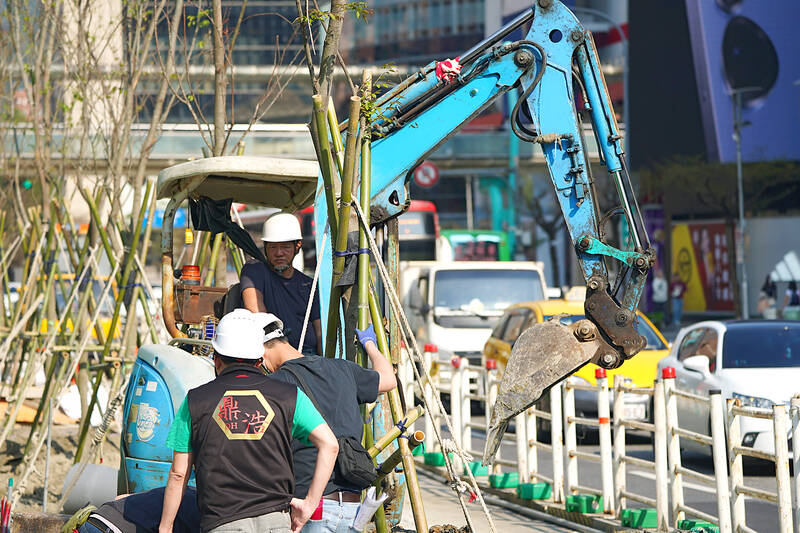Taiwan’s labor market showed signs of resilience and modest improvement last month, with the unemployment rate edging down 0.03 percentage points from the previous month to 3.32 percent, the Directorate-General of Budget, Accounting and Statistics (DGBAS) said yesterday.
The data terminated a two-month upward trend and represented the lowest unemployment rate for April in 25 years, the agency said, adding that the reading after seasonal adjustments held steady at 3.36 percent.
“The domestic job market continued to reflect overall stability,” Census Department Deputy Director Tan Wen-ling (譚文玲) told a news conference.

Photo: CNA
Geopolitical uncertainties, such as “reciprocal” tariffs announced by US President Donald Trump, had little direct impact on last month’s figures, Tan said.
Barring unexpected shocks, the unemployment rate for this month is expected to drop further, despite a slight uptick in the number of people with reduced work hours, she said.
The number of unemployed people last month was about 399,000, down about 4,000, or 0.99 percent, from a month earlier, the DGBAS said in its monthly report.
People who left their previous positions due to job dissatisfaction shrank by 1,000, while first-time jobseekers dropped by 2,000, it said.
Unemployment remained disproportionately high among young people. Those aged 20 to 24 had the highest unemployment rate of 11.3 percent, as first-time jobseekers need more time to adjust to the real world, Tan said.
The age bracket of 15 to 19 was second with 8.15 percent unemployed and the 25-to-29 age group had an average jobless rate of 5.69 percent, the agency said.
By educational breakdown, people with university diplomas reported the highest unemployment rate of 4.47 percent, followed by high-school and vocational-school graduates at 3.12 percent, and those with a graduate degree at 2.9 percent, it said.
The average unemployment period was 20.1 weeks, up 0.5 weeks from the previous month, the DGBAS said.
First-time jobseekers faced longer searches for work, averaging 23.5 weeks, it said.
Overall, the data suggest that Taiwan’s labor market continued to navigate global headwinds with relative strength, even though youth unemployment and long-term joblessness remain persistent challenges, Tan said.
Other labor utilization indicators displayed mixed outcomes.
The number of people underemployed due to insufficient work hours rose by 3,000 to 116,000, while the potential labor force declined by 4,000 to 127,000, the DGBAS said.
The broader labor underutilization rate dropped to 3.36 percent, a 0.05 percentage point fall from the previous month, it said.
Regionally, Taiwan’s seasonally adjusted unemployment rate of 3.36 percent compared unfavorably with South Korea’s 2.7 percent, Japan’s 2.5 percent and Hong Kong’s 3.2 percent, it said.

SETBACK: Apple’s India iPhone push has been disrupted after Foxconn recalled hundreds of Chinese engineers, amid Beijing’s attempts to curb tech transfers Apple Inc assembly partner Hon Hai Precision Industry Co (鴻海精密), also known internationally as Foxconn Technology Group (富士康科技集團), has recalled about 300 Chinese engineers from a factory in India, the latest setback for the iPhone maker’s push to rapidly expand in the country. The extraction of Chinese workers from the factory of Yuzhan Technology (India) Private Ltd, a Hon Hai component unit, in southern Tamil Nadu state, is the second such move in a few months. The company has started flying in Taiwanese engineers to replace staff leaving, people familiar with the matter said, asking not to be named, as the

The prices of gasoline and diesel at domestic fuel stations are to rise NT$0.1 and NT$0.4 per liter this week respectively, after international crude oil prices rose last week, CPC Corp, Taiwan (台灣中油) and Formosa Petrochemical Corp (台塑石化) announced yesterday. Effective today, gasoline prices at CPC and Formosa stations are to rise to NT$27.3, NT$28.8 and NT$30.8 per liter for 92, 95 and 98-octane unleaded gasoline respectively, the companies said in separate statements. The price of premium diesel is to rise to NT$26.2 per liter at CPC stations and NT$26 at Formosa pumps, they said. The announcements came after international crude oil prices

SinoPac Financial Holdings Co (永豐金控) is weighing whether to add a life insurance business to its portfolio, but would tread cautiously after completing three acquisitions in quick succession, president Stanley Chu (朱士廷) said yesterday. “We are carefully considering whether life insurance should play a role in SinoPac’s business map,” Chu told reporters ahead of an earnings conference. “Our priority is to ensure the success of the deals we have already made, even though we are tracking some possible targets.” Local media have reported that Mercuries Life Insurance Co (三商美邦人壽), which is seeking buyers amid financial strains, has invited three financial

CAUTION: Right now, artificial intelligence runs on faith, not productivity and eventually, the risk of a bubble will emerge,’ TIER economist Gordon Sun said Taiwanese manufacturers turned more optimistic last month, ending a five-month streak of declining sentiment as concerns over US tariffs, currency volatility and China’s overcapacity began to ease, the Taiwan Institute of Economic Research (TIER) said yesterday. The manufacturing business confidence index rose 1.17 points from June to 86.8, its first rebound since February. TIER economist Gordon Sun (孫明德) attributed the uptick to fading trade uncertainties, a steadier New Taiwan dollar and reduced competitive pressure from Chinese producers. Taiwan’s semiconductor industry is unlikely to face significant damage from Washington’s ongoing probe into semiconductors, given the US’ reliance on Taiwanese chips to power artificial